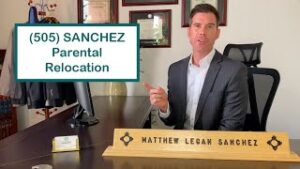Are you interested in the legal guidelines for relocating with kids in Albuquerque, New Mexico?
Moving can be a stressful experience, especially when children are involved. If you’re considering relocating with your kids in Albuquerque, it’s essential to understand the legal guidelines that govern this process. Join Sanchez Legal Team as we explore the key legal considerations you need to be aware of when moving with children in Albuquerque, NM.
From understanding custody laws to navigating visitation rights and creating a solid Parenting Plan, there are many factors to consider ensuring a smooth transition for both you and your children.
By familiarizing yourself with the legal guidelines and seeking the advice of an experienced Albuquerque family law attorney, you can protect your parental rights and make the best decisions for your family’s well-being. Whether you’re considering a local move or relocating across state lines, this guide will equip you with the information you need to make informed decisions during this challenging time.
Don’t let the legal complexities overwhelm you. Read on to discover the legal guidelines for relocating with kids in Albuquerque and ensure a smooth transition for your family.
LEGAL CONSIDERATIONS WHEN RELOCATING WITH KIDS IN ALBUQUERQUE, NEW MEXICO
Relocating with children involves various legal considerations that must be considered to ensure a smooth transition for everyone involved.
One of the primary concerns is understanding custody and visitation rights.
UNDERSTANDING CUSTODY AND VISITATION RIGHTS
When it comes to relocating with children, custody and visitation rights play a crucial role. In Albuquerque, custody can be either sole or joint. Sole custody means that one parent has exclusive or primary physical and/or legal custody of the child. In other words, sole legal custody could mean that one parent can exclusively make decisions that impact the child.
On the other hand, joint custody involves both parents sharing physical and legal custody. With joint legal custody, both parents can make decisions that impact the child’s development.
With joint legal custody, both parents must agree to a major change to the child’s “status quo.” If not, then an New Mexico family court must decide the issue. New Mexico family courts always base custody, visitation, and relocation issues on the best interests of the child.
Do you have an existing custody case? If so, do you have sole custody of your child and are considering relocating? In this situation, it is best practice to seek permission from the court or the other parent before relocating. If not, even with sole legal custody, if you move without permission from either your ex or the court, your assigned judge could force you return to New Mexico.
Moreover, do you have joint custody? If yes, you need to negotiate with the other parent and agree about the proposed relocation. If not, then your assigned family court judge must grant you permission to relocate with your child.
Failing to get the co-parent or judge’s permission could result in an Emergency Motion for Immediate Return of the Child. This Motion could result in an Order requiring you to return to NM with your child. This process could cause increased difficulty, expense, stress, and uncertainty.
PARENTAL RELOCATION LAWS IN ALBUQUERQUE, NEW MEXICO
Albuquerque has specific laws and policies that govern parental relocation. Under New Mexico law, if the parent with joint custody of the child wants to relocate, they may be required to provide written notice to the other parent at least 60 days in advance. In this respect, the existing Custody Order or Parenting Plan is instructive about the notice and consent that is required to move the child away from Albuquerque, or New Mexico.
Usually, the notice should include the intended new address, the reason for the move, and a proposed revised custody and visitation schedule.
The other parent then has the right to object to the proposed relocation. Once again, the existing Court Order or Parenting Plan may provide the guidelines for moving the child.
In situations where the existing Order or Parenting Plan are silent regarding relocation, best practice is for a parent to get the co-parent or court’s permission before relocating. This is true even when one parent has sole legal custody. Even with sole legal custody, the court could force the parent to return to NM, if the parent relocates without permission.
Do you want to move your child from New Mexico to another state? If so, is the other parent contesting the relocation and you have an existing custody case? In this situation, even with sole legal custody, the best practice is to file a Motion to Relocate with the Minor Child.
The court will schedule a hearing to determine whether the relocation is in the best interests of the child.
UNDERSTANDING THE COURT PROCESS FOR CHILD RELOCATION CASES
In Albuquerque, the court usually will begin by setting a Summary Hour Hearing. This Hearing is essentially a pre-trial conference where the assigned Judge hears the issues and determines how the case will proceed.
Moving forward, the case could take one of several paths. Which path the case takes depends on the unique facts and assigned judge. First, the judge may decide to set an Evidentiary Hearing. This Hearing is basically a trial. At this trial, the parties make statements, evidence is introduced, and witnesses may testify. At the end of this hearing, the judge may decide whether the child can move or not.
Second, your judge may refer your case to Court Clinic for a Risk Relocation Assessment. Whether the court takes this path depends on your case’s facts, complexity, and the Court Clinic’s availability.
Third, your judge may appoint a Guardian Ad Litem to become involved and investigate the matter. This investigation is usually much more in-depth than the Court Clinic process. Also, this process is usually much more expensive than the Court Clinic process.
The Court Clinic and GAL process are similar in the respect that after the investigation a hearing is usually held. At this hearing, the Court Clinician or GAL testifies if the proposed relocation best serves the child. The assigned judge is highly influenced by this recommendation regarding the child’s best interests.
Check out this video to better understand parent-child relocation cases in Albuquerque, New Mexico.
MODIFYING CUSTODY AND VISITATION AGREEMENTS
Relocating with children often requires modifications to existing custody and visitation agreements. If both parents agree on the proposed changes, it is advisable to document the modifications in writing and submit them to the court for approval.
Usually, this updated order is captured through a Stipulated Order. This Stipulated Order details the parent’s mutual agreement that changes the existing Custody Order or Parenting Plan. The Stipulated Order ensures that the changes are legally binding and enforceable.
However, if the parents cannot reach an agreement, the court will decide based on the best interests of the child.
Factors such as the child’s relationship with each parent, the impact of the relocation on the child’s education and social life, and the ability of each parent to facilitate a continued relationship with the non-relocating parent will be considered.
FACTORS CONSIDERED BY THE COURT WITH NEW MEXICO CHILD RELCOATION CASES
When deciding whether to grant a parent’s request for relocation, the NM family judges usually take various factors into account. Some of the key factors considered include:
First, what are the reasons for the relocation? Here, the court evaluates the motives behind the move and determines whether they are in the best interests of the child. Valid reasons may include job opportunities, educational opportunities, or a need to be closer to family support.
Second, judges analyze the child’s relationship with each parent. The court will assess the quality and strength of the child’s relationship with each parent and evaluate how the relocation may impact these relationships. Maintaining a stable and healthy parent-child bond is a significant consideration.
Third, courts consider the child’s connection with New Mexico. Here, the court considers the child’s roots or connections with New Mexico. For instance, how long has the child lived in New Mexico? Moreover, what are the child’s family connections in NM, relative to the other state? Finally, does the child have deep roots with New Mexico through religion, education, medical care? Usually, the more roots that the child has with NM – the harder that it is to uproot the child.
Fifth, judges consider the proposed relocation’s impact on the child’s relationship with the other parent. New Mexico presumes that joint legal custody best serves a child. Moreover, NM law assumes that children are best served when raised by both parents. Accordingly, the court assesses each parent’s ability to facilitate continued contact between the child and the non-relocating parent. Moreover, the court considers the moves impact on a parent’s bonding and future relationship with the child.
HIRING A TOP ALBUQUERQUE FAMILY LAW ATTORNEY FOR GUIDANCE
Like many child custody issues, navigating the legal complexities of relocating with children can be challenging. To ensure that your parental rights are protected and that you make informed decisions, it is advisable to seek the guidance of an experienced family law attorney in Albuquerque, New Mexico.
A family law attorney specializing in custody and relocation cases can provide valuable advice and representation throughout the process. They have the knowledge and expertise to navigate the legal system, negotiate with the other parent, and advocate for your rights and the best interests of your child.
Ultimately, NM family court judges decide child custody and relocation issues based on a child’s best interests.
Click the image below to check out this informative video to better understand the best interests of the child standard in New Mexico.
TIPS FOR A SMOOTH RELOCATION WITH KIDS IN NEW MEXICO
In addition to understanding the legal guidelines, there are several practical tips to consider for a smooth relocation with kids in New Mexico:
Involve your children in the process. Here, talk to your children about the move and involve them in the decision-making process as much as possible. This will help them feel more in control and reduce anxiety.
Next, plan. This process can often take a year or more when the court becomes involved. Start planning the relocation well in advance to ensure a smooth transition. Make a checklist of tasks, such as transferring school records, finding a new pediatrician, and notifying relevant parties of your change of address.
Third, maintain routines and familiarize your children with the new area. For example, establish and maintain routines throughout the moving process to provide stability for your children. Additionally, take the time to explore the new area with your children and familiarize them with their new surroundings.
Finally, communicate with your co-parent. For instance, maintain open and respectful communication with the other parent throughout the process. Address any concerns or objections they may have and work together to find solutions that prioritize the best interests of your children.
FINAL THOUGHTS ON RELOCATING WITH KIDS IN ALBUQUERQUE, NEW MEXICO
Relocating with children can be a challenging and emotionally charged experience. This is especially true because contested relocation cases involve a black and white – yes or no – position. At times, there is no gray area with relocation cases.
Consequently, with parent-child relocation cases, one parent often leaves the process feeling like the loser. This yin-yang, winner-loser result is different from most child custody cases where the court may “split the baby,” consider both parents requests, and meet somewhere in the middle.
By understanding the legal guidelines and seeking the guidance of an experienced family law attorney, you can navigate the process more effectively and protect your parental rights.
Remember to familiarize yourself with the custody and visitation laws in Albuquerque, follow the proper notification procedures, and be prepared to modify custody and visitation agreements if necessary. Additionally, maintaining open communication and considering the best interests of your children throughout the relocation process will help ensure a smoother transition for everyone involved.
While relocating with kids may present unique challenges, with proper planning, understanding of the legal guidelines, and support from professionals, you can successfully navigate this transitional period and create a positive environment for your children in their new home.
Are you looking for a top-rated Albuquerque family lawyer in New Mexico?
You’ve found the right place.
Sanchez Legal Team excels with Albuquerque uncontested divorce, child custody, restraining order, and kinship guardianship matters.
Call (505) SANCHEZ and speak with one of Albuquerque’s best divorce, domestic violence, and family law attorneys.










